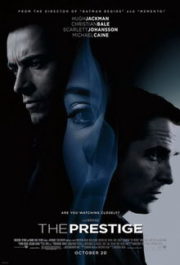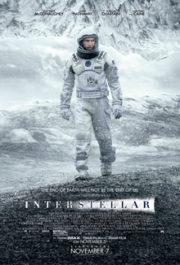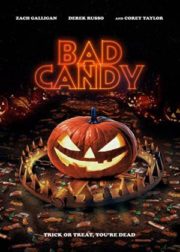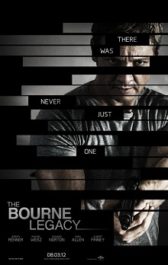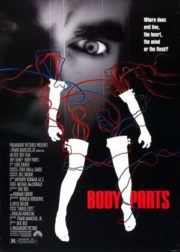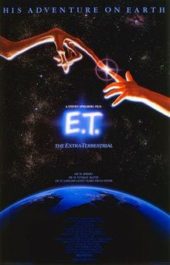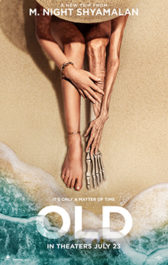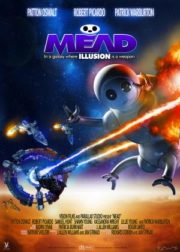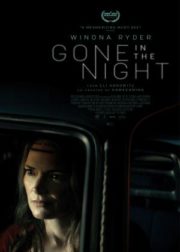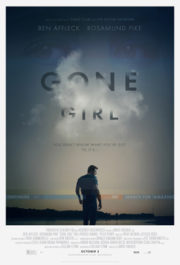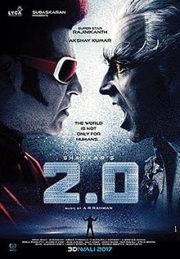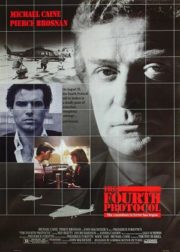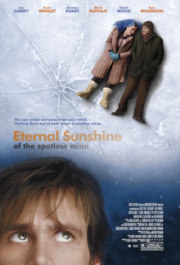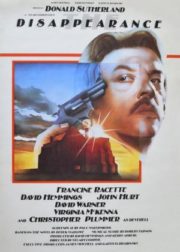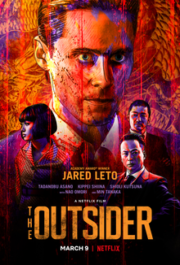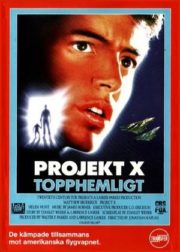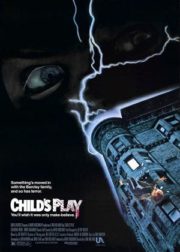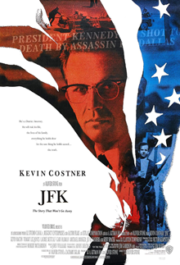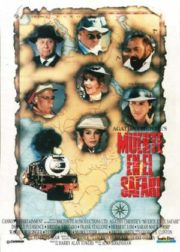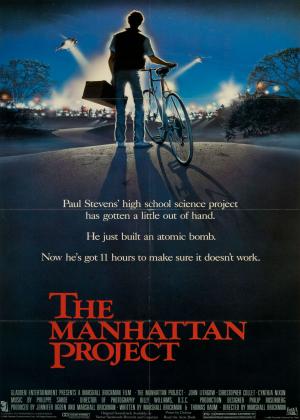
“The Manhattan Project” is a 1986 film directed by Marshall Brickman. It is a thriller-drama that revolves around the story of a high school student named Paul Stephens, played by Christopher Collet, who becomes involved in the creation of a nuclear bomb.
The film explores Paul’s passion for science and his growing fascination with the potential power of nuclear weapons. He becomes determined to build his own atomic bomb, using his knowledge and resources from a nearby nuclear research facility. As Paul progresses with his project, he catches the attention of Dr. John Mathewson, a nuclear physicist played by John Lithgow, who becomes suspicious of the young student’s activities.
As the film progresses, the tension escalates as Paul’s secret project attracts the interest of government agents who believe that he may pose a threat to national security. The stakes rise, and Paul must confront the moral implications of his actions, the consequences of building a weapon of mass destruction, and the potential danger it poses to the world.
“The Manhattan Project” takes its name from the real-life project during World War II that resulted in the creation of the first atomic bombs. While the film is a work of fiction, it draws inspiration from the historical context and the ethical debates surrounding nuclear weapons.
The movie received generally positive reviews for its engaging storyline, strong performances, and the thought-provoking themes it explores. Christopher Collet delivers a compelling performance as the intelligent and driven Paul, while John Lithgow brings a sense of gravitas to his role as the concerned scientist.
“The Manhattan Project” tackles the ethical dilemmas associated with nuclear weapons and the potential dangers of scientific advancements falling into the wrong hands. It raises questions about the responsibility of scientists, the balance between national security and individual liberties, and the moral implications of technological advancements.
Overall, “The Manhattan Project” is a suspenseful thriller that explores the moral and ethical complexities of nuclear weapons through the eyes of a determined teenager. It combines elements of science, drama, and suspense to tell a thought-provoking story that raises important questions about the use and consequences of nuclear technology.
Submit your review | |
Alright, folks, buckle up for "The Manhattan Project"! This groovy flick from 1986 takes you on a wild ride filled with teenage brainiacs, government secrets, and more nuclear drama than you can shake a Geiger counter at.
So, we got this kid named Paul Stephens, played by Christopher Collet, who's like a science prodigy on steroids. Instead of using his powers for good or something boring like that, he decides to build his own freakin' nuclear bomb. Yeah, you heard that right. Homegrown nukes right in his backyard! Talk about a DIY project gone nuclear!
Of course, all hell breaks loose when the government catches wind of Paul's little science experiment. Enter John Lithgow as Dr. John Mathewson, the voice of reason in this whole chaotic mess. He's all like, "Dude, you can't just go around building atomic bombs like it's a science fair project!" But you know Paul, he's a rebel with a Geiger counter, and he's not backing down.
"The Manhattan Project" is like a rollercoaster ride of hijinks and teenage genius. It's got that '80s vibe, complete with big hair, questionable fashion choices, and a killer synth-pop soundtrack. You'll be bopping your head along while wondering how this kid managed to outsmart everyone with his MacGyver-level skills.
Now, let's be real. This movie ain't exactly a scientific masterpiece. Some of the stuff they pull off in this film would make any physicist cringe. But hey, who needs realism when you've got teenage rebellion and nuclear explosions, am I right? Just suspend your disbelief, grab some popcorn, and enjoy the ride.
"The Manhattan Project" may not be the most intellectually stimulating film out there, but it's a helluva fun time. It's like watching a crazy science experiment gone wrong, with plenty of laughs and suspense along the way. And hey, if you're a fan of '80s nostalgia and cheesy special effects, this movie is right up your alley.
So, if you're in the mood for some nuclear mayhem and teenage genius run amok, check out "The Manhattan Project." It's a wacky, offbeat adventure that's sure to entertain. Just remember, folks, leave the nuclear experiments to the professionals. We don't need any backyard mushroom clouds, okay?
Get ready for a blast from the past with "The Manhattan Project"! This 1986 film takes us on a wild ride filled with teenage brilliance, government intrigue, and, of course, a healthy dose of nuclear shenanigans.
Meet Paul Stephens, played by the charming Christopher Collet. He's not your average high school student. No, sir! Paul is a scientific prodigy with a knack for mischief. When he decides to build his own nuclear bomb in his backyard, you know things are about to get explosive. It's like "Back to the Future" meets "Dr. Strangelove" with a dash of teenage rebellion thrown in.
John Lithgow, sporting a lab coat and a furrowed brow, plays the concerned nuclear physicist, Dr. John Mathewson. He's the voice of reason in this chaos, desperately trying to prevent Paul's scientific experiment from turning into a full-blown catastrophe. Will he succeed? Or will Paul's genius get the best of him?
"The Manhattan Project" is a delightful mix of comedy, suspense, and teenage angst. It doesn't take itself too seriously, and that's part of its charm. Sure, the plot may have a few holes larger than the Grand Canyon, and some of the science may be a bit, well, questionable. But who needs scientific accuracy when you have teenage rebellion and homemade nuclear bombs?
The film's retro vibes, complete with big hair, neon colors, and synth-pop soundtrack, transport us straight back to the '80s. It's like a time capsule of cheesy goodness, filled with laughable special effects and delightfully corny dialogue. Embrace the absurdity, and you're in for a nostalgic treat.
"The Manhattan Project" is a reminder that sometimes it's okay to switch off your brain and enjoy the ride. It's a goofy, tongue-in-cheek romp through the world of teenage geniuses and the perils of nuclear experiments gone awry. So grab your popcorn, buckle up, and prepare for a hilariously explosive adventure!
In conclusion, "The Manhattan Project" is a jocular ride that combines teenage genius, nuclear mischief, and '80s nostalgia. It may not be the most scientifically accurate or intellectually profound film out there, but it sure knows how to have fun. So, if you're in the mood for a light-hearted and campy flick, give it a go. Just remember, don't try this at home—building your own nuclear bomb is probably not the best idea!
"The Manhattan Project," directed by Marshall Brickman in 1986, is a captivating thriller that delves into the moral quandaries surrounding nuclear power and its potential consequences. With a well-paced narrative and strong performances, the film effectively explores the ethical dilemmas faced by its characters while delivering an engaging and thought-provoking experience.
The story centers around Paul Stephens, portrayed convincingly by Christopher Collet, a brilliant high school student with a keen interest in science. Paul's curiosity and ambition lead him to embark on a secret project: constructing his own nuclear bomb. As his project gains momentum, it catches the attention of Dr. John Mathewson, a nuclear physicist portrayed skillfully by John Lithgow, who becomes increasingly concerned about the potential dangers posed by Paul's experiment.
"The Manhattan Project" skillfully balances suspense and moral introspection as Paul's actions attract the attention of government agencies and heighten the tension surrounding his project. The film raises vital questions about the responsibility of scientific research, the ethical implications of nuclear power, and the potential threats posed by unchecked technological advancements.
Christopher Collet delivers a compelling performance, capturing the conflicting emotions of a gifted but conflicted teenager. John Lithgow's portrayal of Dr. Mathewson adds depth and gravitas to the story, as he grapples with his own moral compass and the dilemma of protecting society while still encouraging scientific progress.
The film effectively captures the atmosphere of the 1980s, reflecting the anxieties of the Cold War era and the growing concerns surrounding nuclear weapons. The cinematography and production design complement the story, providing a visual backdrop that enhances the film's overall impact.
"The Manhattan Project" shines in its exploration of the moral complexities surrounding nuclear power and its potential for both positive and devastating consequences. It prompts viewers to reflect on the delicate balance between scientific advancement, national security, and the preservation of human life.
While the film's premise is rooted in reality, it does take some liberties for dramatic effect. Some aspects may stretch credibility, and a few plot developments may feel contrived. However, these minor flaws do not detract significantly from the film's overall impact.
In conclusion, "The Manhattan Project" is a gripping and thought-provoking thriller that tackles the ethical dilemmas and potential dangers associated with nuclear power. With strong performances, an engaging storyline, and its exploration of moral responsibility, the film successfully captures the tensions and anxieties of the era. For those interested in suspenseful dramas that prompt deeper reflection, "The Manhattan Project" offers a compelling exploration of the ethical implications of scientific progress and the consequences of unchecked ambition.

